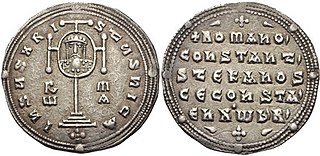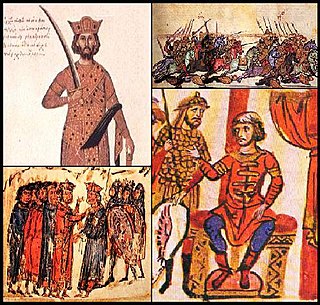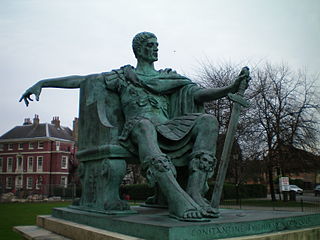Constantine II may refer to:

Year 685 (DCLXXXV) was a common year starting on Sunday of the Julian calendar. The denomination 685 for this year has been used since the early medieval period, when the Anno Domini calendar era became the prevalent method in Europe for naming years.

Year 912 (CMXII) was a leap year starting on Wednesday of the Julian calendar.

Basil I, called the Macedonian, was a Byzantine Emperor who reigned from 867 to 886. Born a simple peasant in the theme of Macedonia, he rose in the Imperial court. He entered into the service of Theophilitzes, a relative of Emperor Michael III, and was given a fortune by the wealthy Danielis. He gained the favour of Michael III, whose mistress he married on the emperor's orders, and was proclaimed co-emperor in 866. He ordered the assassination of Michael the next year. Despite his humble origins, he showed great ability in running the affairs of state. He was the founder of the Macedonian dynasty. He was succeeded upon his death by his son Leo VI.

Leo V the Armenian was Emperor of the Byzantine Empire from 813 to 820. A senior general, he forced his predecessor, Michael I Rangabe, to abdicate and assumed the throne. He ended the decade-long war with the Bulgars, and initiated the second period of Byzantine Iconoclasm. He was assassinated by supporters of Michael the Amorian, one of his most trusted generals, who succeeded him on the throne.

Romanos I Lekapenos, Latinized as Romanus I Lecapenus, was an Armenian who became a Byzantine naval commander and reigned as Byzantine Emperor from 920 until his deposition on December 16, 944.
Constantine III may refer to:

Germanus I was the Patriarch of Constantinople from 715 to 730. He is regarded as a saint, by both the Orthodox and Roman Catholic Churches, with a feast day of 12 May. He had been ecumenically preceded by Patriarch John VI of Constantinople, and was succeeded in Orthodox rite by patriarch Constantine II of Constantinople.

Constans II, also called Constantine the Bearded, was emperor of the Byzantine Empire from 641 to 668. He was the last emperor to serve as consul, in 642. Constans is a nickname given to the Emperor, who had been baptized Herakleios and reigned officially as Constantine. The nickname established itself in Byzantine texts and has become standard in modern historiography.
This is an alphabetical index of people, places, things, and concepts related to or originating from the Byzantine Empire. Feel free to add more, and create missing pages. You can track changes to the articles included in this list from here.

The Macedonian dynasty ruled the Byzantine Empire from 867 to 1056, following the Amorian dynasty. During this period, the Byzantine state reached its greatest extent since the Muslim conquests, and the Macedonian Renaissance in letters and arts began. The dynasty was named after its founder, Basil I the Macedonian who came from the Theme of Macedonia, which, at the time, was part of Thrace.

The Byzantine–Bulgarian wars were a series of conflicts fought between the Byzantines and Bulgarians which began when the Bulgars first settled in the Balkan peninsula in the 5th century, and intensified with the expansion of the Bulgarian Empire to the southwest after 680 AD. The Byzantines and Bulgarians continued to clash over the next century with variable success, until the Bulgarians, led by Krum, inflicted a series of crushing defeats on the Byzantines. After Krum died in 814, his son Omurtag negotiated a thirty-year peace treaty. Simeon I, who ruled Bulgaria from 893 to 927 had multiple successful campaigns against the Byzantines. His son Peter I negotiated another long-lasting peace treaty. His rule was followed by a period of decline of the Bulgarian state.

The Byzantine Empire was ruled by the Isaurian or Syrian dynasty from 717 to 802. The Isaurian emperors were successful in defending and consolidating the Empire against the Caliphate after the onslaught of the early Muslim conquests, but were less successful in Europe, where they suffered setbacks against the Bulgars, had to give up the Exarchate of Ravenna, and lost influence over Italy and the Papacy to the growing power of the Franks.
Fausta was the Byzantine empress as the wife of Constans II.
Heraclius was a Byzantine emperor.

Constantine is a masculine and feminine given name and surname which is derived from the Latin name Constantinus, a hypocoristic of the first names Constans and Constantius, both meaning "constant, steadfast" in Latin. The popularity stems from the eleven Roman and Byzantine emperors, beginning with St. Constantine I.
Constantine I (272–337), popularly known as Constantine the Great, was a Roman Emperor.
Articles related to Christianity include:
Martinus or Marinus was caesar of the Byzantine Empire from c. 638–September/October 641. Martinus was the son of Emperor Heraclius and Empress Martina. Under Heraclius, Martinus was elevated to caesar in c. 638. Heraclius left the Byzantine Empire to two of Martinus' brothers, Constantine III and Heraklonas; Constantine soon died of tuberculosis, though some of his partisans alleged that he was poisoned by Martina. One such partisan, Valentinus, led troops to Chalcedon to force Martina to make Constans II, the son of Constantine, co-emperor. Valentinus seized Constantinople regardless in September/October 641, and deposed Martina, Heraklonas, and Martinus, and cut off Martinus' nose and emasculated him, before exiling him to Rhodes.










